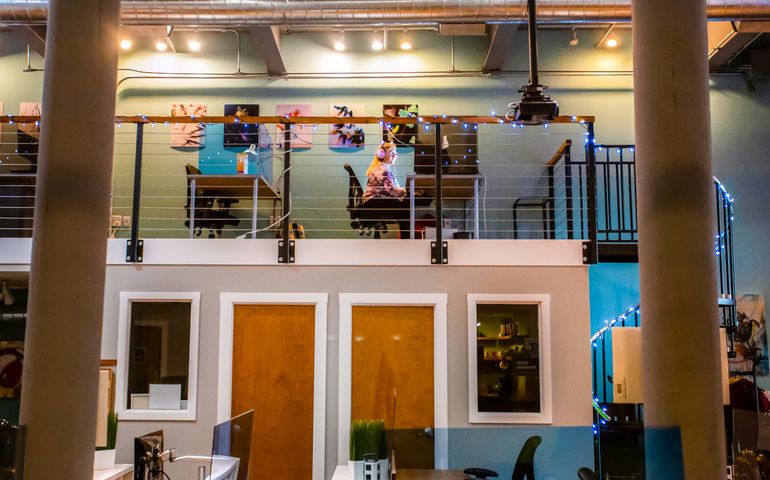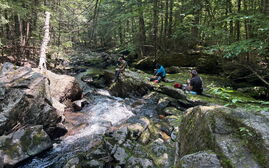With grant, Maine hopes to reignite interest in coworking and collaborative workspaces
 PHOTO / TIM GREENWAY
A new state grant program seeks to create more coworking and collaborative workspaces to support entrepreneurship. Kelly Beecher, with Booz Allen Hamilton, is shown here at the Pepperell Mill Think Tank, a coworking space in Biddeford.
PHOTO / TIM GREENWAY
A new state grant program seeks to create more coworking and collaborative workspaces to support entrepreneurship. Kelly Beecher, with Booz Allen Hamilton, is shown here at the Pepperell Mill Think Tank, a coworking space in Biddeford.
While Maine's interest in coworking slumped last year because of the pandemic, the state is trying to reboot the concept through a $200,000 grant program designed to create more collaborative workspaces and support entrepreneurship.
Gov. Janet Mills on Thursday announced guidelines for the Maine Coworking Development Fund and Program, which was established by the Maine Legislature in 2015 but was not funded until 2019.
At the time, Mills, with support from then-Assistant Majority Leader Ryan Fecteau of Biddeford, recognized coworking as a promising element of entrepreneurship support and recapitalized the fund to expand coworking spaces.
“We knew before the pandemic that Maine, with all its strengths, was well-positioned to welcome more remote workers,” Mills said in a news release. “With the onset of the pandemic, and with our success in keeping our state one of the safest places in the country, our ability to attract remote workers has only grown.”
The latest investment grant program aims to expand access to coworking and collaborative workspaces throughout the state, ultimately producing a range of economic benefits.
Coworking spaces have proven to be great business incubators in Maine communities, said Fecteau.
“They attract entrepreneurs of all ages and they serve as a hub for Maine’s roughly 15,000 remote workers,” he said. “Given our tourism economy, coworking spaces could very well mean our visitors spend an extra week in Bethel, Millinocket, Presque Isle or Portland.”
Heather Johnson, commissioner of the Department of Economic and Community Development, said coworking spaces build community and connection for early-stage entrepreneurs, freelancers and remote workers. The grant program aims to support expansion or upgrades of current coworking spaces, and to help create new ones.
“Coworking spaces continue to play a role to the long-term economic growth of Maine,” Johnson said. “They are among the amenities that can be offered to tourists, they serve as a hub of information and community for remote workers, as well as a signal to entrepreneurs and new businesses that a community understands the value of connection.”
Awards of up to $20,000 per collaborative workspace business can be used for a broad range of activities that support the program’s goals of strengthening opportunities for entrepreneurship; stimulating innovation; and addressing regional market demand for affordable work environments that support communication, information sharing and networking opportunities.
In support of these goals, the department will also launch regular meetings of participating coworking spaces to encourage connections and collaboration.
Applications for grant funds will be reviewed competitively against five criteria: connection to program goals; application enterprise and team; project goals and impact; economic and community impact; business plan and budget, with additional weight given to projects located in economically distressed geographic areas.
For grant guidelines, click here.
In 2019, the department awarded grants to 19 businesses. In addition to this program, the state is investing $5 million through the Maine Jobs & Recovery Plan to attract remote workers to Maine and to provide for additional grants to support collaborative workspaces.














0 Comments